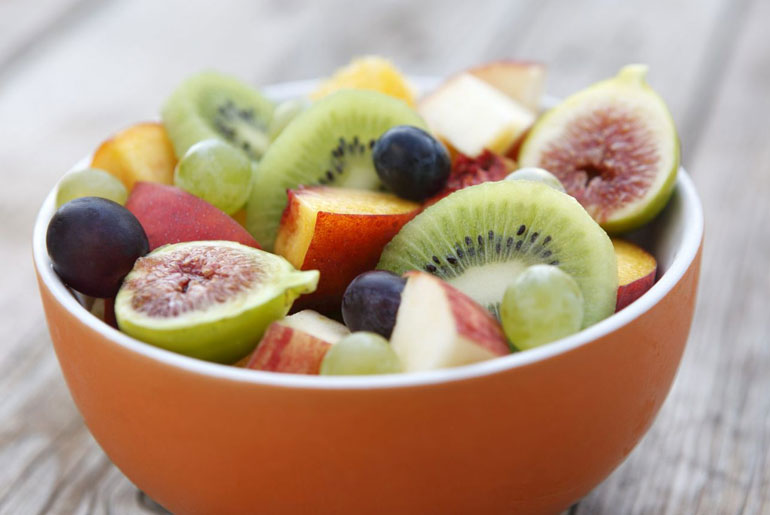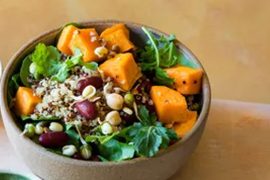While fruits are undoubtedly nutritious and beneficial for the body, relying solely on them for dinner can indeed pose long-term health risks. Nutrition experts caution against adopting a fruit-only diet, especially for dinner, as it may not provide the necessary balance of macronutrients essential for our health.
Fruits for dinner may not be advisable:
- Lack of protein: Protein is crucial for various bodily functions, including muscle repair and growth, hormone production, and immune function. Most fruits are low in protein, so relying solely on them may lead to poor protein intake, which can affect muscle mass, metabolism, and overall health.
- Insufficient fats: Healthy fats are essential for proper brain function, hormone production, and absorption of fat-soluble vitamins. While some fruits contain small amounts of fats, they are primarily carbohydrates. A diet devoid of sufficient healthy fats may lead to deficiencies and health issue in long term.
- Carbohydrate imbalance: While fruits are a source of carbohydrates, they primarily provide simple sugars. Consuming a large quantity of fruits in one meal can lead to spikes in blood sugar level, followed by crashes, which may negatively impact energy levels and mood.
- Missing micronutrients: While fruits are rich in vitamins, minerals, and antioxidants, they may not provide all the essential nutrients needed for health. A balanced diet that includes a variety of foods ensures adequate intake of all micronutrients necessary for various bodily functions.
- Digestive issues: Eating only fruits for dinner may not provide enough fiber to support healthy digestion. Additionally, some individuals may experience bloating or discomfort from consuming large quantities of fruit in one sitting.
Fruits are a healthy part of a balanced diet, relying solely on them for dinner can lead to nutrient deficiencies and other health issues in the long term. Include a variety of foods from different food groups to ensure adequate intake of all essential nutrients for optimal health. Consulting with a registered dietitian or nutritionist can help develop a balanced eating plan tailored to individual needs and goals.
“It is sad when you hear someone saying something about food and decide to follow it blindly without realising the repercussions that it can pose towards your body. Here I am breaking one of the most common myths of today about whether you can eat fruits in dinner or not. The answer is no. Dinner needs to be light but balanced in nature. Traditionally, Indians have been consuming preparations like pulao, Khichdi, dalia, and millet dosas for dinner. These are always topped up with ghee or eaten along with dal/kadi to fulfil the protein content. That makes a complete meal. But when some day you decide to start eating only and only fruits for dinner- you basically starve your body,” states Nutritionist.
“I will not suggest consuming only fruits in dinner meal for general population with no underlying medical conditions. We think wheat has carbs and sugar but fruits also contain carbs and has natural sugar. I usually suggest consuming fruits in breakfast or as evening snack but not as a main meal. One can definitely watch portion sizes consuming in dinner. Dinner is our major meal when the entire family sits together and enjoys dinner. Little quantity of fruits is fine to consume in dinner with other options, but not just fruits. It is important to focus on both micro and macro nutrients. Both are equally important. We can meet our daily nutritional requirements with balanced meal only. Each food group is important whether cereals, pulses, milk and milk products or fruits and vegetables,” states Dietician.
Bhardwaj says there’s no major disadvantage in consuming fruits in dinner but it’s important to take balanced nutrition in other meals in that case. “In case one skipped breakfast and lunch and taking only fruits in dinner, it’s definitely not advisable,” says the nutritionist.
nutritious snack like an apple or some nuts before bed can be a good choice if you’re feeling hungry after having an early dinner. Both apples and nuts offer a combination of fiber, vitamins, minerals, and healthy fats that can help satisfy hunger and provide sustained energy without causing discomfort or disrupting sleep. Additionally, these snacks are generally easy to digest, which is important before bedtime. However, it’s essential to listen to your body and choose snacks that work best for you and your dietary preferences. If you find yourself frequently hungry before bed, it may also be worth examining the composition and timing of your dinner to ensure it’s providing enough satiety and nutrients to carry you through the night.
These dinner options suggested by Kapoor are indeed balanced and nutritious, providing a mix of carbohydrates, proteins, fiber, vitamins, and minerals essential for overall health. Here’s a breakdown of each:
- Khichdi and sabzi: Khichdi is a combination of rice and lentils cooked together, usually served with a side of cooked vegetables. It’s light on the stomach yet provides a good balance of carbohydrates and proteins.
- Dal and chawal: This classic Indian meal consists of lentils (dal) served with rice (chawal). Lentils are a great source of protein and fiber, while rice offers carbohydrates for energy.
- Millet Khichdi: Using millets instead of rice in khichdi adds a nutritional punch, as millets are rich in fiber, vitamins, and minerals compared to refined grains.
- Millet dosa and sambar: Millet dosa is made from fermented batter and served with sambar, a lentil-based vegetable stew. This meal offers a good mix of carbohydrates, proteins, and probiotics from fermentation.
- Dalia made with milk: Dalia, also known as broken wheat, cooked with milk is a wholesome meal providing complex carbohydrates, proteins, and calcium.
- Egg pulao: Pulao made with eggs offers a protein-rich dinner option with the added flavors of spices and vegetables.
- Egg curry and rice: Eggs cooked in a flavorful curry sauce, served with rice, provides a hearty and nutritious meal high in protein and essential nutrients.
- Omelette with chapati and sabzi: Omelette paired with whole wheat chapati and cooked vegetables offers a balanced combination of protein, carbohydrates, and fiber.
- Roti, sabzi, dal: A staple Indian meal comprising whole wheat roti (flatbread), cooked vegetables (sabzi), and lentils (dal), providing a complete array of nutrients.
- Roti sabzi and kadi: Roti served with cooked vegetables and kadhi, a yogurt-based curry, is a comforting and nutritious meal rich in protein, fiber, and probiotics.
These options can help ensure that your dinner is not only satisfying but also provides the essential nutrients your body needs for optimal health.
Disclaimer:
The information contained in this article is for educational and informational purposes only and is not intended as a health advice. We would ask you to consult a qualified professional or medical expert to gain additional knowledge before you choose to consume any product or perform any exercise.








